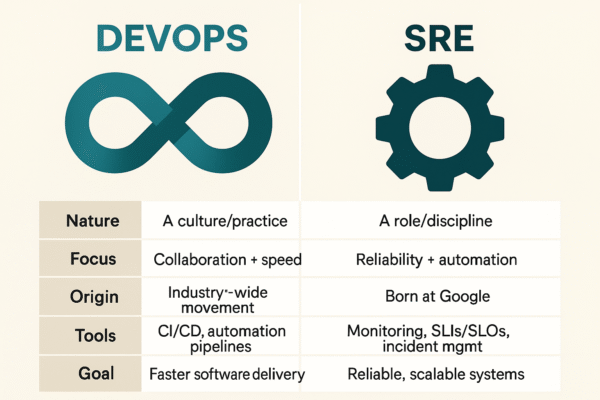DevOps vs SRE: Key Differences Explained
Both DevOps and SRE (Site Reliability Engineering) aim to deliver software faster and keep it reliable. But they approach the goal differently.
DevOps in Simple Terms
DevOps is a culture that unites developers (who write code) and operations teams (who run the code). It focuses on speed, collaboration, and automation.
🔹 Example: Amazon uses DevOps to push new code every few seconds with CI/CD pipelines and automation.
Key Points:
-
A cultural shift, not a job title.
-
Emphasizes CI/CD, automation, and faster feedback.
-
Goal: quicker software delivery.
SRE in Simple Terms
SRE, born at Google, is an engineering discipline that applies software principles to operations. SREs write code to automate tasks, monitor systems, and ensure reliability at scale.
🔹 Example: Google SRE teams keep Gmail, YouTube, and Search running with 99.9% uptime using error budgets, monitoring, and incident response.
Key Points:
-
A defined role and practice.
-
Focuses on SLIs, SLOs, automation, and reliability.
-
Goal: stable, scalable systems.
The Difference at a Glance
| Aspect | DevOps | SRE |
|---|---|---|
| Nature | Culture/practice | Role/discipline |
| Focus | Collaboration + speed | Reliability + automation |
| Origin | Industry movement | Born at Google |
| Tools | CI/CD, automation pipelines | Monitoring, SLIs/SLOs |
| Goal | Faster delivery | Reliable systems |
How They Work Together
It’s not DevOps vs SRE. DevOps sets the culture, while SRE offers concrete practices to achieve reliability.
🔹 Netflix example: Combines DevOps speed with SRE reliability (like chaos engineering) to stream smoothly worldwide.
Quick Takeaway
-
DevOps = culture for speed
-
SRE = discipline for reliability
-
Together, they ensure software is shipped fast and works reliably in production.


